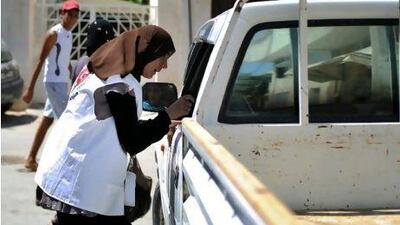SIDI HASSINE, TUNISIA // "In all the other elections they fiddled the numbers - why should elections now be any different?"
The speaker, Mohamed, was slumped in a chair in his perfume shop in Sidi Hassine, a rundown suburb of Tunis. In the doorway stood Halima Mzoughi, 19, a campaigner from the Islamist Ennahda party, urging him to vote.
"Inshallah, the elections will be transparent and then all the parties will take part in writing a new constitution," she said. "Why did we have a revolution, if not for change?"
Ms Mzoughi's appeal to Mohamed, who did not give his surname, illustrates a larger challenge for political parties asking Tunisians to vote for them: convincing Tunisians to vote at all.
So far 3.2 million of 7.5 million eligible voters have registered for October 23 elections, according to Tunisia's electoral commission. Two weeks ago, Tunisia extended registration from August 2 to August 14 to give voters more time.
The elections will create a national assembly to rewrite Tunisia's constitution, while the electoral process could offer lessons to other countries hoping to bury dictatorship through the ballot box.
A whopping 92 per cent of Tunisians want to vote, according to a March/April poll by the International Foundation for Electoral Systems, a US non-profit organisation. But many are confused by registration, unfamiliar with parties and jaded by politics, analysts and party activists said.
Election officials rely initially on Facebook to communicate with voters, leaving many unaware that registration is open, wrote Duncan Pickard, a Harvard University graduate student in public policy, last month in the Carnegie Endowment for International Peace's Arab Reform Bulletin.
While voters who do not register can still vote using their ID cards, "the information on those cards is not always reliable," said Chouikha el Arbi, a member of the electoral commission. "The key thing is to create a new body of data that is clean and trustworthy."
The electoral commission has stepped up efforts to encourage voters over the past fortnight, with TV and radio spots urging them to register.
Meanwhile, many Tunisians still want details on party platforms before voting, as indicated by a study in May by the National Democratic Institute, a US non-profit.
That presents a special challenge for Ennahda, expected to top the elections despite stirring controversy. Its emphasis on religion strikes a chord with many Tunisians but worries others that the party secretly harbours a radical agenda.
Ennahda leaders reject that claim and say their willingness to work with other parties to craft a new constitution.
Persecuted for decades by Tunisia's presidents, Habib Bourguiba and Zine el Abidine Ben Ali, Ennahda says that it supports democracy and women's rights, and has pledged to work with other parties to draft a new constitution.
The party has become a juggernaut since Mr Ben Ali was ousted from power in January allowed it to operate freely, with regional offices, public meetings and a grassroots campaign to get out the vote.
One recent Saturday morning, that campaign brought Ms Mzoughi and over a dozen fellow activists into the streets of Sidi Hassine, where they live.
Wearing matching white vests with Ennahda's logo, the group swarmed down the main street, urging shop owners and pedestrians to vote.
They filtered into the market, distributing leaflets among the fruit stalls, and re-emerged onto the street where Ms Mzoughi crashed headlong into the scepticism of Mohamed, the perfume shop owner.
"Many people I talk to worry that the elections won't be clean, and you can't blame them," she said after the encounter. "For fifty years, that's how it was done."
Sidi Hassine suffered under Mr Ben Ali, with years of neglect evident in decrepit buildings and bare-bones public services that leave piles of rubbish in the streets.
Ms Mzoughi, an IT student, supports Ennahda because "they talk about religion more than the other parties," she said. "With them I'm comfortable wearing my hijab."
Ennahda leaders cast the party as a promoter of Tunisia's Arab-Muslim heritage, setting it at odds with secularist parties that also opposed Mr Ben Ali's regime.
"The elections are a key moment in Tunisia's democratic transition: a contest between Islamism and democratic centrism," said Wissam Sghaier, 28, head of the youth section of the Progressive Democratic Party (PDP), which has emerged as Ennahda's most visible rival.
Like Ennahda, the PDP is deploying thousands of youth volunteers to urge Tunisians to vote and get the party's name into public consciousness.
"There are over 100 parties now," said Mr Sghaier, who coordinates day-to-day canvassing work. "The party whose programme is known will win in the field."
Mr Sghaier is part of a campaigning machine constructed by Mahmoud Mazoughi, a retired army general who heads the PDP's grassroots activities. Lacking experience in politics until joining the PDP this year, Mr Mazoughi tapped into the internet for ideas. "I put 'Obama door-to-door' into Google and just started reading," he said.
The PDP has so far recruited some 8,200 volunteers, with just over 2,000 of them trained for campaigning, Mr Sghaier said.
Mr Mazoughi wants that database to become a backbone for future campaigns. "There will be more elections after this one, and we'll be participating," he said.
For Mr Pickard, writing in the Arab Reform Bulletin, October's elections will provide some measure of the power of revolution.
"We know that revolutions can topple dictators," he wrote. "The Tunisian elections will test whether they can build democracies."
jthorne@thenational.ae

Tunisia's voters cynical after 50 years of corruption
New political parties inspired by Tunisia's revolution find would-be voters less than inspired by upcoming election.
Most popular today
